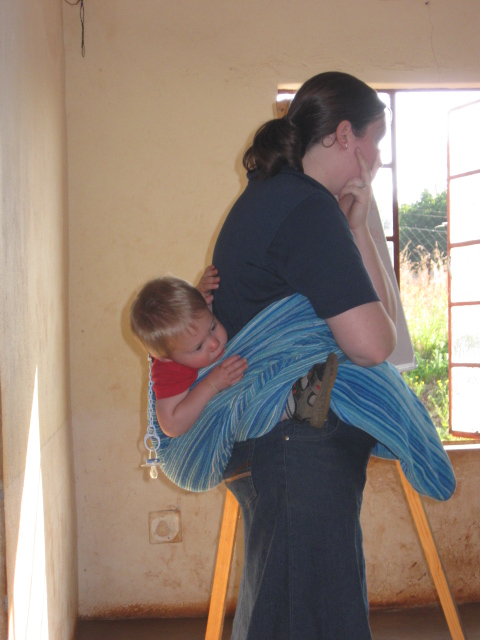A
long time ago when someone was interested in possibly joining our
ministry here, our team compiled a list of what we thought were
missionary "essentials" in order for our team to work well. If you
wanted to join our team, we hoped that you would agree with these
essentials and have them in your own life. Since then, I've sometimes
thought of other "essentials," or at least, good-to-haves. I thought I'd
share them with you when the mood strikes.
So what makes a good missionary?
One of the original points on the list was
a sense of humor.
We were not made to carry the gravity of the most serious task in the
world without a break of merriment. Steel can only be stressed so long
and so hard. Now this point does not require that you would be expected
to perform extemporaneous stand-up comedian routines, but can you
recognize humor and have an appropriate sense of humor?
This is
actually an important issue in team ministry. What we laugh about says a
lot about us. Likewise, what a culture in general finds funny
communicates their worldview and character. So in a mission team, when
there is only one other person or couple in your large area who
understands
both your home culture
and your host culture, it can be extremely frustrating if the teammate laughs at things that you deem
un-funny,
or highly disappointing if they don't see the humor in something you
find obviously hilarious. In fact, we can get very angry about what
others laugh at or don't laugh at.
You won't be sorry if you read this very long quote that says this much better than I can:
...I
propose to cut through it by considering one of the raw materials from
which culture is built, namely laughter. All rational beings laugh--and
maybe only rational beings laugh. And all rational beings benefit from
laughing. As a result there has emerged a peculiar human
institution--that of the joke, the repeatable performance in words or
gestures that is designed as an object of laughter.
Now there is a
great difficulty in saying exactly what laughter is. It is not just a
sound....Nor is it just a thought, like the thought of some object as
incongruous. It is a response to something, which also involves a judgment of that thing.
Moreover, it is not an individual peculiarity....Laughter is an
expression of amusement. Laughter begins as a collective condition, as
when children giggle together over some absurdity. And in
adulthood amusement remains one of the ways in which human beings enjoy
each other's company, become reconciled to their differences, and accept
their common lot. Laughter helps us to overcome our isolation and
fortifies us against despair.
That does not mean that
laughter is subjective in the sense that "anything goes," or that it is
uncritical of its object. On the contrary, jokes are the object of
fierce disputes, and many are dismissed as "not funny," "in bad taste,"
"offensive," and so on. The habit of laughing at things is not detachable from the habit of judging things to be worthy of laughter. Indeed, amusement, although a spontaneous outflow of social emotion, is also the most frequently practiced form of judgment. To
laugh at something is already to judge it, and when we refrain from
laughing at what someone nevertheless believes to be funny, we may
thereby show our disapproval of that person's stance.
~Roger Scruton in Culture Counts, pgs. 6-7
When
stressful events rain down all at once like it's trial monsoon season
or it seems like your life is an all-too-frequent example of Murphy's
Law (we had
nine machines break in a short period of time one year--car, fridge, stove
blew up, etc.), sometimes you have to crack a sarcastic joke about it.
When
you're going nuts because of some element of the host culture that
you're not used to or even think is rude, sometimes it is cathartic to
laugh with your teammates until the tears come to your eyes at the
unexpectedness of this or that happening. Just keeps you sane sometimes
and helps to release the anger or bitterness that shouldn't be there.
Those
are examples of how you might laugh at events out of your control, such
as elements of your host culture. But being able to laugh at
yourself
is perhaps even more important. Isn't that really an element of
humility? To be able to laugh at yourself when you make a language
mistake or harmless cultural gaffe or have a most embarrassing moment on
furlough, etc., is very important as well. Be humble, and laugh at
yourself.
 |
| I
was embarrassed to see this proof of my failure to tie my baby to my
back African style that my teammates took of me while I was keeping
score at a Bible Quiz tournament. But it WAS funny! |
Seth
has tried before to pin down what people may universally find funny,
and he came up with this: "Connecting two things in an unexpected way."
You weren't expecting those two ideas to be put together like that. Let
me give you one example recently that our team found funny in our host
culture because it was unexpected. There is danger in giving examples
because someone may miss my main point in shooting down the example, but
here goes:
Recently our team laughed until there were tears in
our eyes over someone's account and imitation of a song blared at his
house. Here is an event that frustrated the missionary couple: neighbors
20 meters away put up 4-foot high speakers and
blared an
inane, offensive song so loudly in the direction of their house that the
speakers went staticky; and this continued for hours, including the
kids' naptimes. (I'm sure this is a common issue for missionaries, not
only in Africa.) Now, this is actually a very frustrating occurrence,
and we began by expressing our sympathy for them. The funny part was
when the narrator told us, and then
imitated, what was in the song: belching.
Completely unexpected. Songs and belching don't go together. Add to that
volume.
These Africans liked this music so much, they wanted it to be heard
loudly by everyone! Who produces this music??? It's just...funny.
Now
some people at this point may object. "You're judging their culture.
You're laughing at them!" Our politically correct culture doesn't like
to laugh at other people's cultures. But as that quote above begins to
express, we are making judgments all the time in what we laugh at. Every
culture does this. Some things shouldn't or can't be laughed about. For
example, when someone is hurt or when something is sinful, we shouldn't
laugh at those things. Some people have a cutting sense of humor that
only makes fun of others in a belittling or demeaning way. That's
inappropriate. But some things
can and
should be laughed at.
And
that brings me to the next objection: "Are you saying someone shouldn't
be a missionary if they don't have a sense of humor? What if they just
don't have the
same sense of humor as
you?" Exactly. This is the issue.
It
isn't enough to say that the teammate must have a sense of humor. Even
though we may judge another person with the statement, "He doesn't have a
sense of humor," what we mean is, "He doesn't appreciate
my sense of humor." Or "I don't appreciate
his
sense of humor." So that is the key. Can that teammate laugh at things
that you deem important to laugh at? Can she laugh at herself? Can you
laugh together over similar things without one squirming with discomfort
or another blankly staring in misunderstanding?
Remember that
excellent quote above: "And in adulthood amusement remains one of the
ways in which human beings enjoy each other's company, become reconciled
to their differences, and accept their common lot.
Laughter helps us to
overcome our isolation and fortifies us against despair."
Yes, some things shouldn't be laughed at. But on the other hand, "a merry heart doeth good like a medicine."
































